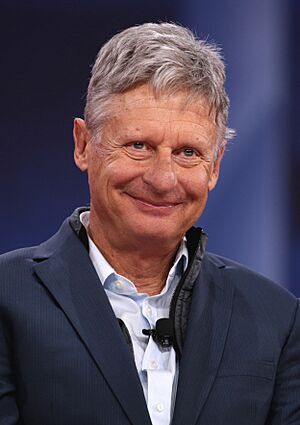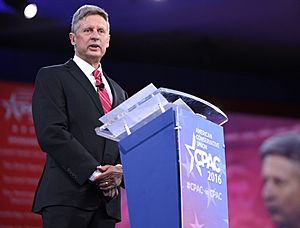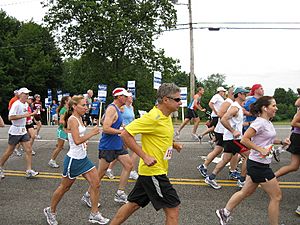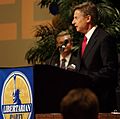Gary Johnson facts for kids
Quick facts for kids
Gary Johnson
|
|
|---|---|

Johnson in 2018
|
|
| 29th Governor of New Mexico | |
| In office January 1, 1995 – January 1, 2003 |
|
| Lieutenant | Walter Bradley |
| Preceded by | Bruce King |
| Succeeded by | Bill Richardson |
| Personal details | |
| Born |
Gary Earl Johnson
January 1, 1953 Minot, North Dakota, U.S. |
| Political party | Libertarian (2011–present) |
| Other political affiliations |
Republican (until 2011) |
| Spouse |
Denise Simms
(m. 1977; div. 2005) |
| Domestic partner | Kate Prusack (engaged 2009) |
| Children | 2 |
| Education | University of New Mexico (BS) |
| Signature | |
Gary Earl Johnson (born January 1, 1953) is an American businessman and politician. He served as the 29th governor of New Mexico from 1995 to 2003. He was first a member of the Republican Party. Later, he joined the Libertarian Party.
As a Libertarian, Johnson ran for President of the United States in 2012 and 2016. In 2016, he received nearly 4.5 million votes. This was the most votes a Libertarian candidate had ever received. He also ran for the U.S. Senate in 2018. Before his political career, he started and ran a successful construction company.
Contents
Early Life and Business Career
Gary Johnson was born in Minot, North Dakota. His family later moved to Albuquerque, New Mexico. In high school, he was a good athlete on the track team. He went to the University of New Mexico and earned a degree in political science in 1975.
While in college, Johnson worked as a handyman, going door-to-door to find jobs. He was so successful that he started his own company in 1976 called Big J Enterprises. At first, he was the only employee. His business grew much larger after getting a big contract from the technology company Intel.
Johnson's company became one of the biggest construction companies in New Mexico, with over 1,000 employees. He sold the company in 1999, after he had already become governor.
Governor of New Mexico (1995-2003)
In 1994, Johnson decided to run for governor of New Mexico. He used his own money to help pay for his campaign. He promised to use a "common sense business approach" to run the state government. He won the election and became governor in January 1995.
First Term
As governor, Johnson wanted to lower taxes and reduce government spending. He was famous for using his veto power. A veto is when a governor rejects a bill passed by the state legislature to stop it from becoming a law. In his first six months, he vetoed 200 bills. This was a national record.
Johnson wanted to cut many different taxes, but the legislature only passed a cut on the gasoline tax. He also increased spending on education to try to help schools improve.
Second Term
Johnson was reelected in 1998. He became the first governor of New Mexico to serve two four-year terms in a row. In his second term, he focused on improving schools. He also became one of the most high-profile politicians to say that certain drug laws should be changed. He believed these laws were not working well.
During his time as governor, Johnson set a record for using his veto power more than all the other 49 governors combined. When he left office in 2003, New Mexico's government had a large budget surplus, which means it had more money than it spent.
In 2000, a large forest fire called the Cerro Grande Fire caused a lot of damage in New Mexico. Johnson was praised for his leadership during the crisis. He helped organize government agencies and even helped put out small flames with his feet.
Presidential Campaigns
After being governor, Johnson ran for president twice as a member of the Libertarian Party. Libertarians generally believe in more individual freedom and less government involvement in people's lives.
2012 Campaign
Johnson first ran for president in 2012. He wanted to lower government spending, protect people's rights, and keep the military out of other countries' conflicts. He received about 1.3 million votes, which was more than any other third-party candidate in that election.
2016 Campaign
Johnson ran for president again in 2016. His running mate was Bill Weld, another former governor. This campaign received much more attention. Johnson was able to get his name on the ballot in all 50 states.
During the campaign, he had some famous moments in interviews. In one, he asked, "What is Aleppo?" when questioned about the war-torn city in Syria. In another, he could not name a foreign leader he admired. These moments were widely reported in the news.
Despite this, Johnson received nearly 4.5 million votes. This was about 3.3% of the total vote and the best result for a Libertarian presidential candidate in history. After the election, he said he would not run for president again.
2018 U.S. Senate Race
In 2018, Johnson ran for a seat in the United States Senate representing New Mexico. He ran as a Libertarian against the Democratic and Republican candidates. He finished in third place with about 15% of the vote.
Key Political Views
Johnson's political views are often described as fiscally conservative (wanting lower taxes and spending) and socially liberal (supporting personal freedoms).
- Taxes: He supports lower and simpler taxes. As governor, he cut taxes 14 times.
- Government Spending: He believes the federal government should balance its budget, meaning it should not spend more money than it takes in.
- Civil Liberties: He is a strong supporter of individual rights and freedoms. He supports the right to privacy and opposes government spying on citizens.
- Foreign Policy: He believes the U.S. should not get involved in wars in other countries unless it is necessary for self-defense. He wants to reduce military spending.
- Immigration: He supports making it easier for people to immigrate to the U.S. legally. He believes a simpler system would help reduce illegal immigration.
Personal Life
Johnson was married to Dee Simms from 1977 to 2005. They had two children together. Dee passed away in 2006. In 2009, Johnson became engaged to Kate Prusack.
Johnson is a very active athlete. He has competed in many triathlons, marathons, and bike races. He is also an accomplished mountain climber. He has climbed the tallest mountain on every continent, including Mount Everest. These seven mountains are known as the Seven Summits.
In 2005, he had a serious paragliding accident and fell about 50 feet. He broke several bones but recovered from his injuries.
Electoral history
| 1994 New Mexico gubernatorial election | |||||
|---|---|---|---|---|---|
| Party | Candidate | Votes | % | ±% | |
| Republican | Gary Johnson | 232,945 | 49.8% | +4.7% | |
| Democratic | Bruce King (inc.) | 186,686 | 39.9% | -14.7% | |
| Green | Roberto Mondragón | 47,990 | 10.3% | ||
| Majority | 46,259 | 9.9% | +0.4% | ||
| Turnout | 467,621 | ||||
| Republican gain from Democrat | Swing | ||||
| 1998 New Mexico gubernatorial election | |||||
|---|---|---|---|---|---|
| Party | Candidate | Votes | % | ±% | |
| Republican | Gary Johnson (inc.) | 271,948 | 54.5% | +4.7% | |
| Democratic | Martin Chávez | 226,755 | 45.5% | +5.6% | |
| Majority | 45,193 | 9.1% | -0.8% | ||
| Turnout | 498,703 | ||||
| Republican hold | Swing | ||||
| 2012 United States presidential election
Election on November 6, 2012 |
|||||
|---|---|---|---|---|---|
| Party | Candidate | Votes | % | ±% | |
| Democratic | Barack Obama (inc.) | 65,915,795 | 51.2% | -1.8% | |
| Republican | Mitt Romney | 60,933,504 | 47.3% | +1.6% | |
| Libertarian | Gary Johnson | 1,275,971 | 1.0% | +0.6% | |
| Green | Jill Stein | 469,627 | 0.4% | +0.2% | |
| Constitution | Virgil Goode | 121,616 | 0.1% | -0.1% | |
| Others | Others | 434,247 | 0.3% | -0.5% | |
| Majority | (1,333,513) | (1.0%) | |||
| Turnout | 129,132,140 | 57.5% | |||
| Democrat hold | Swing | ||||
| 2016 United States presidential election
Election on November 8, 2016 |
|||||
|---|---|---|---|---|---|
| Party | Candidate | Votes | % | ±% | |
| Republican | Donald Trump | 62,984,828 | 46.1% | -1.1% | |
| Democratic | Hillary Clinton | 65,853,514 | 48.2% | -3.0% | |
| Libertarian | Gary Johnson | 4,489,235 | 3.3% | +2.3% | |
| Green | Jill Stein | 1,457,226 | 1.1% | +0.7% | |
| Constitution | Darrell Castle | 203,069 | 0.1% | 0% | |
| Others | Others | 984,722 | 0.7% | +0.4% | |
| Republican gain from Democrat | Swing | ||||
| 2018 United States Senate election in New Mexico | |||||
|---|---|---|---|---|---|
| Party | Candidate | Votes | % | ±% | |
| Democratic | Martin Heinrich (inc.) | 373,799 | 54.0% | ||
| Republican | Mick Rich | 211,301 | 30.6% | ||
| Libertarian | Gary Johnson | 106,524 | 15.4% | ||
Images for kids
-
Johnson at Ron Paul's "Rally for the Republic" in 2008
-
Johnson speaking at an October 2016 rally in Phoenix, Arizona
See also
 In Spanish: Gary Johnson para niños
In Spanish: Gary Johnson para niños
 | Charles R. Drew |
 | Benjamin Banneker |
 | Jane C. Wright |
 | Roger Arliner Young |








